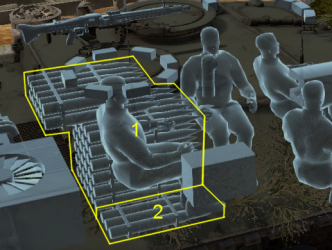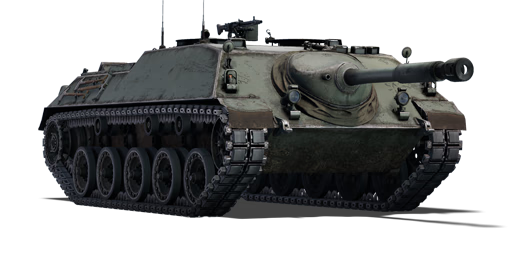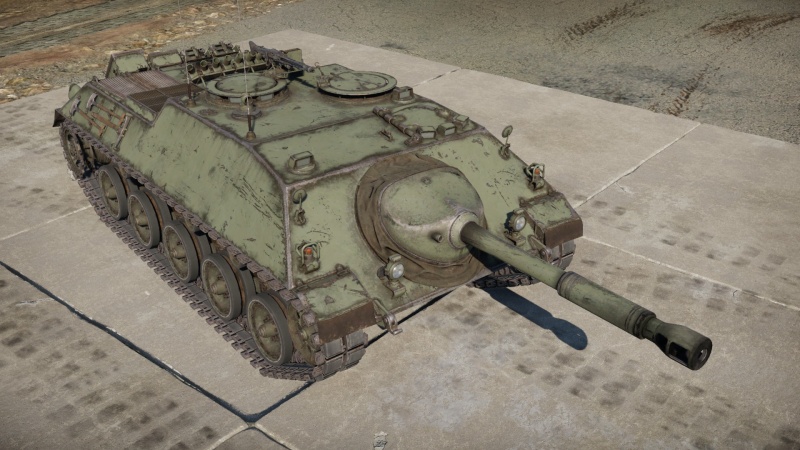Difference between revisions of "JPz 4-5"
(→Armaments: Updated) |
m (→Mobility) (Tag: Visual edit) |
||
| Line 42: | Line 42: | ||
The {{PAGENAME}} is quite mobile for a tank destroyer due to its light weight, which means it can get into a sniping position early in the game and quickly change locations if spotted. | The {{PAGENAME}} is quite mobile for a tank destroyer due to its light weight, which means it can get into a sniping position early in the game and quickly change locations if spotted. | ||
| − | The reverse speed is very good, cruising at -30/-20 km/h (AB/RB) in a heartbeat, | + | The reverse speed is very good, cruising at -30/-20 km/h (AB/RB) in a heartbeat,tops out in around -51/-43 km/h. |
=== Modifications and economy === | === Modifications and economy === | ||
| Line 54: | Line 54: | ||
{{main|BK90 (90 mm)}} | {{main|BK90 (90 mm)}} | ||
| − | Equipped with Rheinmetall BK 90/L40 90 mm anti-tank gun. When the Soviets began deploying their [[T-64A (1971)|T-64]] and [[T-72A|T-72]] main battle tanks, the 90 mm gun was not capable of engaging them in long-range combat and at that point the Kanonenjagdpanzer 90 mm became obsolete, despite the claims from manufacturers that the JPz 4-5 could be rearmed with a 105 mm gun. | + | Equipped with Rheinmetall BK 90/L40 90 mm anti-tank gun. When the Soviets began deploying their [[T-64A (1971)|T-64]] and [[T-72A|T-72]] main battle tanks, the 90 mm gun was not capable of engaging them in long-range combat and at that point the Kanonenjagdpanzer 90 mm became obsolete, despite the claims from manufacturers that the JPz 4-5 could be rearmed with a 105 mm gun. Once you unlock the heatfs, the JPz 4-5 will become a decent tank |
{| class="wikitable" style="text-align:center" width="100%" | {| class="wikitable" style="text-align:center" width="100%" | ||
| Line 84: | Line 84: | ||
| DM502 || HESH || 102 || 102 || 102 || 102 || 102 || 102 | | DM502 || HESH || 102 || 102 || 102 || 102 || 102 || 102 | ||
|- | |- | ||
| − | | M71 | + | | M71 || HE || 13 || 13 || 13 || 13 || 13 || 13 |
|- | |- | ||
| − | | M431 | + | | M431 || HEATFS || 320 || 320 || 320 || 320 || 320 || 320 |
|- | |- | ||
|} | |} | ||
| Line 105: | Line 105: | ||
| DM502 || HESH || 853 || 10.6 || 0.1 || 4 || 3,050 || 73° || 77° || 80° | | DM502 || HESH || 853 || 10.6 || 0.1 || 4 || 3,050 || 73° || 77° || 80° | ||
|- | |- | ||
| − | | M71 | + | | M71 || HE || 823 || 10.55 || 0 || 0.1 || 925 || 79° || 80° || 81° |
|- | |- | ||
| − | | M431 | + | | M431 || HEATFS || 1,216 || 5.8 || 0.05 || 0.1 || 712.64 || 65° || 72° || 77° |
|- | |- | ||
|} | |} | ||
Revision as of 05:51, 3 December 2021
Contents
Description
The Hanomag-Henschel JPz 4-5 or Kanonenjagdpanzer is a rank IV German tank destroyer with a battle rating of 6.3 (AB/RB/SB). It was introduced in Update 1.53 "Firestorm". Built on the Ru 251 chassis, the JPz 4-5 takes the design of the World War II Jagdpanzer IV to have a low profile in order to perform ambush duties against enemy tanks.
General info
Survivability and armour
The 50 mm thick frontal plate protects the crew against heavy machine gun fire and some small calibre cannons. Care must be taken in regards to strafing planes since .50 cal rounds can penetrate your roof armour with ease, usually resulting in 1-2 crew loss and potential engine fire.
Armour type:
- Rolled homogeneous armour
- Cast homogeneous armour (Gun mantlet)
| Armour | Front (Slope angle) | Sides (Slope angle) | Rear (Slope angle) | Roof |
|---|---|---|---|---|
| Hull Superstructure | 50 mm (51°) Front glacis 50 mm (54°) Lower glacis |
30 mm (35°) Top 30 mm Bottom |
30 mm (44°) Top 30 mm (41°) Bottom |
10 mm General area 20 mm Front part |
| Armour | Sides | Roof | ||
| Cupola | 10 mm | 10 mm |
Notes:
- Suspension wheels are 15 mm thick while tracks are 20 mm thick.
Mobility
| Game Mode | Max Speed (km/h) | Weight (tons) | Engine power (horsepower) | Power-to-weight ratio (hp/ton) | |||
|---|---|---|---|---|---|---|---|
| Forward | Reverse | Stock | Upgraded | Stock | Upgraded | ||
| Arcade | 77 | 77 | 25.5 | 710 | 954 | 27.84 | 37.41 |
| Realistic | 71 | 71 | 442 | 500 | 17.33 | 19.61 | |
The JPz 4-5 is quite mobile for a tank destroyer due to its light weight, which means it can get into a sniping position early in the game and quickly change locations if spotted. The reverse speed is very good, cruising at -30/-20 km/h (AB/RB) in a heartbeat,tops out in around -51/-43 km/h.
Modifications and economy
Armaments
Main armament
Equipped with Rheinmetall BK 90/L40 90 mm anti-tank gun. When the Soviets began deploying their T-64 and T-72 main battle tanks, the 90 mm gun was not capable of engaging them in long-range combat and at that point the Kanonenjagdpanzer 90 mm became obsolete, despite the claims from manufacturers that the JPz 4-5 could be rearmed with a 105 mm gun. Once you unlock the heatfs, the JPz 4-5 will become a decent tank
| 90 mm BK90 | Turret rotation speed (°/s) | Reloading rate (seconds) | |||||||||||
|---|---|---|---|---|---|---|---|---|---|---|---|---|---|
| Mode | Capacity | Vertical | Horizontal | Stabilizer | Stock | Upgraded | Full | Expert | Aced | Stock | Full | Expert | Aced |
| Arcade | 51 | -8°/+15° | ±15° | N/A | 7.04 | 9.75 | 11.84 | 13.10 | 13.93 | 7.28 | 6.44 | 5.94 | 5.60 |
| Realistic | 4.76 | 5.60 | 6.80 | 7.52 | 8.00 | ||||||||
Ammunition
| Penetration statistics | |||||||
|---|---|---|---|---|---|---|---|
| Ammunition | Type of warhead |
Penetration @ 0° Angle of Attack (mm) | |||||
| 10 m | 100 m | 500 m | 1,000 m | 1,500 m | 2,000 m | ||
| DM502 | HESH | 102 | 102 | 102 | 102 | 102 | 102 |
| M71 | HE | 13 | 13 | 13 | 13 | 13 | 13 |
| M431 | HEATFS | 320 | 320 | 320 | 320 | 320 | 320 |
| Shell details | |||||||||
|---|---|---|---|---|---|---|---|---|---|
| Ammunition | Type of warhead |
Velocity (m/s) |
Projectile Mass (kg) |
Fuse delay (m) |
Fuse sensitivity (mm) |
Explosive Mass (TNT equivalent) (g) |
Ricochet | ||
| 0% | 50% | 100% | |||||||
| DM502 | HESH | 853 | 10.6 | 0.1 | 4 | 3,050 | 73° | 77° | 80° |
| M71 | HE | 823 | 10.55 | 0 | 0.1 | 925 | 79° | 80° | 81° |
| M431 | HEATFS | 1,216 | 5.8 | 0.05 | 0.1 | 712.64 | 65° | 72° | 77° |
Ammo racks

| Full ammo |
1st rack empty |
2nd rack empty |
Visual discrepancy |
|---|---|---|---|
| 51 | 4 (+47) | 1 (+50) | No |
Notes:
- The massive first rack depletes from right to left (when seen from behind).
Machine guns
| 7.62 mm MG3A1 | ||||
|---|---|---|---|---|
| Mount | Capacity (Belt) | Fire rate | Vertical | Horizontal |
| Coaxial | 2,500 (1,000) | 1,200 | N/A | N/A |
| Pintle | 2,500 (1,000) | 1,200 | -5°/+25° | ±45° |
Usage in battles
The Jagdpanzer 4-5 is a very hard tank destroyer to master. It shines with excellent mobility and in rate of fire but has some serious downsides as well, such as the lack of a turret and really poor armour all around. The tank is at Rank V, which leaves almost no space for mistakes. Know the map and flank your enemies making use your excellent mobility, but don't get too carried away. Use your great mobility to get a great sniping spot early game, rather than just rushing into a capture point, because if you do, you're most likely going to be in a close-combat fight with another tank at the capture point, and the JPz isn't great in close quarters combat. When you first spawn, drive and find a flanking position that allows you to quickly drive into cover with your fast reverse gear if you make a mistake. Scan the environment for enemies and take them out one by one, but don't get too carried away with it, once you kill 2 or 3 enemy tanks get out of that area and find a different spot, because most players will be looking for you when they respawn in another tank or aircraft. In case of getting spotted get in cover as fast as possible and reposition or wait until your enemy makes a mistake, like driving out into the open or getting bored and pushing or firing their cannon.
The best way to engage the enemy in this tank is to "shoot and scoot" since this vehicle is literally a glass cannon, concealment and cover are the JPz 4-5's best friends. Don't just play the JPz like an MBT and rush into the middle of the map, sure it's fun and you might get 1 or 2 kills but you won't survive very long. Play the JPz like the M41 before it, use your speed to get a sniping spot and move from there.
Play it in a way that you're never spotted by the enemy, because if you're seen by the enemy you are already dead.
Pros and cons
Pros:
- Low profile, meaning enemy will have a hard time searching for your silhouette
- Fast firing gun
- Fast speed and mobility
- HEAT-FS can reliably penetrate Russian sloped armour
- Great sniper (if you like this play style)
Cons:
- Glass cannon, your armour is bad all around
- Small calibre for a fifth rank tank destroyer
- Stock shell is HESH, meaning its harder than usual to research modifications
- Low versatility, meaning its only good at sniping
History
Development
In the Cold War, the Bundeswehr, West Germany's defence forces, envisaged a tactical doctrine of a mobile defence system. This system would require the use of traditional tank destroyers as they were during World War II. Their role would be to provide infantry support against an armoured target with their powerful guns.
Hanomag and Henschel of Germany, along with MOWAG from Switzerland, developed a prototype of a vehicle able to hold the 90 mm gun commonly used in the M47 Patton. The first prototype was made in 1960 and these vehicles were produced until 1967. The vehicle was known as the Kanonenjagdpanzer 4-5, or shortened to Kanonenjagdpanzer. 770 were built for the Bundeswehr, West Germany's defence forces, and 80 of these produced models were also given to Belgium in April 1975.
Design
The Kanonenjagdpanzer takes a huge design similarity to the Jagdpanzer IV design, with a very low profile to present itself less of a target. However, the armour is only 50 mm thick sloping, which itself is the very thing for the era the vehicle was introduced. The vehicle carries a crew of four people to perform its functions. The 90 mm gun is fixed on a casemate structure, thus it has limited traverse like traditional tank destroyer designs. Inside the vehicle, there are provisions for holding 51 rounds for the main gun, plus about 4,000 machine gun rounds for the coaxial. Aside from that, additional protection the vehicle protects is NBC protection to combat against weapons of mass destruction.
Usage
The Kanonenjagdpanzer saw use in tank destroyer companies within mechanized and mountain infantry brigades of the Bundeswehr. However, the newer Soviet second-generation main battle tanks, the T-64 and the T-72, were more than capable of taking on the 90 mm gun the Kanonenjagdpanzer is equipped with, and so the Kanonenjagdpanzer was declared obsolete. The producers tried to lengthen its service life by claiming that the 105 mm L7 gun can be adapted into the design, but this proved fruitless.
The Kanonenjagdpanzer, due to its obsolete status, saw more usage in specialized roles. Between 1983 and 1985, about 163 Kanonenjagdpanzer were converted into Raketenjagdpanzer Jaguar 2 (not to be confused with the Raketenjagdpanzer 2), a vehicle with a TOW anti-tank guided missile on the roof. Others were converted to artillery observation vehicle named Beobachtungspanzer and served in mortar units to direct fire.
The Kanonenjagdpanzer design stayed with the Bundeswehr up until 1990, when they were formally retired from service.
In-game description
The project to develop the self-propelled antitank mount was begun in the mid-1950s by specialists from the companies Hanomag (Hannoversche Maschinenbau AG) and Henschel (Rheinstahl Henschel AG). The base selected for the new vehicle was the Schützenpanzer Lang HS.30 armored transporter. The first prototype of the SPG with the designation Kanonenjagdpanzer 1-3 was assembled in 1959. The tests revealed significant flaws in the vehicle. As a result, more work was done to refine it. The decision was made to arm the new SPG with a 90mm antitank cannon similar to the one installed on the American M47 Patton II.
By 1961 each development company had built its own experimental model. Both models were presented for testing. After comparative testing, as well as the merger of the two companies, the decision was made to combine the efforts of the specialists from both companies in order to build a single experimental model. Work on the creation and testing of the new model continued until 1965.
After all testing was complete in 1966 the new vehicle was accepted as part of the arsenal under the designation JPz 4-5. The SPG was built serially from 1966 to 1967. During its production the companies Hanomag and Henschel each built 385 vehicles.
Media
- Skins
- Videos
See also
External links
| Germany tank destroyers | |
|---|---|
| Pz. I Derivatives | Panzerjäger I |
| Pz. II Derivatives | 15cm sIG 33 B Sfl |
| Pz. 38(t) Derivatives | Marder III · Marder III H · Jagdpanzer 38(t) |
| Pz. III Derivatives | StuG III A · StuG III F · StuG III G · StuH 42 G |
| Pz. IV Derivatives | Jagdpanzer IV · Panzer IV/70(A) · Panzer IV/70(V) · Dicker Max · Nashorn · Brummbär · VFW |
| Pz. V Derivatives | Jagdpanther G1 · Bfw. Jagdpanther G1 |
| Pz. VI Derivatives | Sturer Emil · Elefant · Ferdinand · 38 cm Sturmmörser · Jagdtiger |
| Wheeled/Half-track | 8,8 cm Flak 37 Sfl. · Sd.Kfz.251/9 · Sd.Kfz.251/10 · Sd.Kfz.251/22 · Sd.Kfz.234/3 · Sd.Kfz.234/4 · 15 cm Pz.W.42 |
| ATGM Carrier | RakJPz 2 · RakJPz 2 (HOT) · Wiesel 1A2 |
| Other | Waffenträger · M109G · JPz 4-5 · Raketenautomat · VT1-2 |





